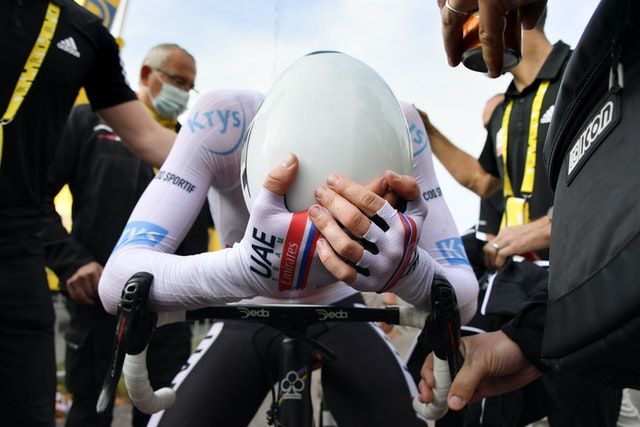
By Michael Pavitt |
When the Tour de France rolled out of Nice last month the smart money was on coronavirus providing a dramatic ending to the race, rather than the riders.
Having already pushed the Grand Tour back from its traditional July dates, talk before the race seemed to focus on when coronavirus would definitively end this year’s edition.
Several regions of France had been placed on alert due to an increase in the number of cases and some were speculating over how organisers would handle determining whether there would be a winner, should the race be called off before the 21 stages had been completed.
The prospect of a team being thrown out of the race should they record two positive coronavirus tests also threatened to potentially derail the event.
The focus pre-race appeared, unsurprisingly, to be on the strange circumstances around the event, including the rolling Tour de France bubble of riders, team staff and race officials, as well as organisers reporting 700,000 masks and two tonnes of sanitiser would be used to keep fans safe should they attend.
Remarkably the race has reached Paris, joining Europe’s domestic football seasons and the US Open on the list of sporting events to have returned and concluded successfully.
I would argue that the other events have felt the impact of taking place behind closed doors, although I understand the financial reasons behind the competitions taking place.
The Tour de France was in the same boat, with Deceuninck-QuickStep general manager Patrick Lefevere having warned back in March that cycling’s economic model may have faced collapse should the race not be held this year.
The race has arguably represented the closest thing to the viewers to a normal pre-coronavirus event, largely due to the presence of spectators by the roadside.
At times it has been easy to forget the coronavirus situation when seeing crowds, with the reminders coming when riders appeared for interview and podium presentations wearing masks, as well as race director Christian Prudhomme testing positive.
The presence of fans appears both a positive and negative for the sport moving forwards.
It has shown one of the main plus points of professional road cycling, with fans able to feel close to the action and the top riders. In this sense the race has been a welcome relief to the stale atmosphere produced by fake crowd noise or no noise at all.
Organisers of races also do not have to face the issue of working out how to return fans to venues.
The problem posed for organisers appears to be the opposite, with large crowds on stages sitting somewhat uncomfortably when considering the rising rate of coronavirus in France and the message potentially sent to viewers at home.
Amaury Sport Organisation said from the start they would adapt to the developing coronavirus situation and they did when announcing a reduction of the number of spectators permitted to attend the finish of each stage.
These measures were also present on the today’s final stage in Paris yet some crowds gathered to welcome riders to the French capital, highlighting the challenge moving forwards.
The race itself has produced numerous interesting storylines, including the suggestion one generation of stars is making way for a new one.
Slovakia’s Peter Sagan has been one of the race’s most dependable characters over the past decade, with the three-time world champion claiming the green points jersey seven times in the past eight years. He surely would have earned an eighth in 2017 had he not been thrown out of the race due to allegedly causing a crash.
Sagan this year has found himself trailing Ireland’s Sam Bennett in the points classification, while Belgian star Wout van Aert has grabbed two stage victories in the fashion we have come to expect from the Slovakian.
The general classification battle did not feature two of cycling’s more established names prior to the race, with Britain’s Chris Froome and Geraint Thomas left out by Ineos Grenadiers for the race with defending champion Egan Bernal favoured.
The collapse of his title defence ended Ineos Grenadiers’ recent dominance, yet no-one would bet against them coming back stronger.
Their place appeared to have been assumed by Team Jumbo-Visma, with Van Aert and Tom Dumoulin having spent much of the past three weeks driving the peloton in support of Primož Roglič, who appeared unflappable on route to claiming Slovenia’s first Tour de France title.
They did finish with a first Slovenian title and the finish the three weeks warranted, even if it felt harsh on Roglič.
Yesterday’s performance from Tadej Pogačar in the individual time trial to overturn a 57 seconds deficit to Roglič and snatch the title away has been the most dramatic sporting highlight so far in this disrupted sporting year.
Van Aert and Dumoulin standing by the side of the road in shock as three weeks’ work was picked apart by the 21-year-old will serve as the defining image of this year’s race. Team Jumbo-Visma had appeared to have managed Pogačar, limiting the UAE Emirates’ rider to ‘just’ the two stage victories.
Pogačar, instead, walks away from the race with the yellow jersey, the mountains and best young rider classifications, and three stage wins after his triumph yesterday.
The youngest Tour de France winner since 1904, who turns 22 tomorrow, appears to have added to the idea that a new generation have now broken through.
The Tour de France has shown us what we have been missing this year, but also the challenges that need to be overcome by events in the current climate.
Both the Giro d’Italia and Vuelta a España follow in the coming months, with the two Grand Tours surely hoping to replicate the success enjoyed by this year’s delayed Tour de France.
Republished with permission from insidethegames.biz.